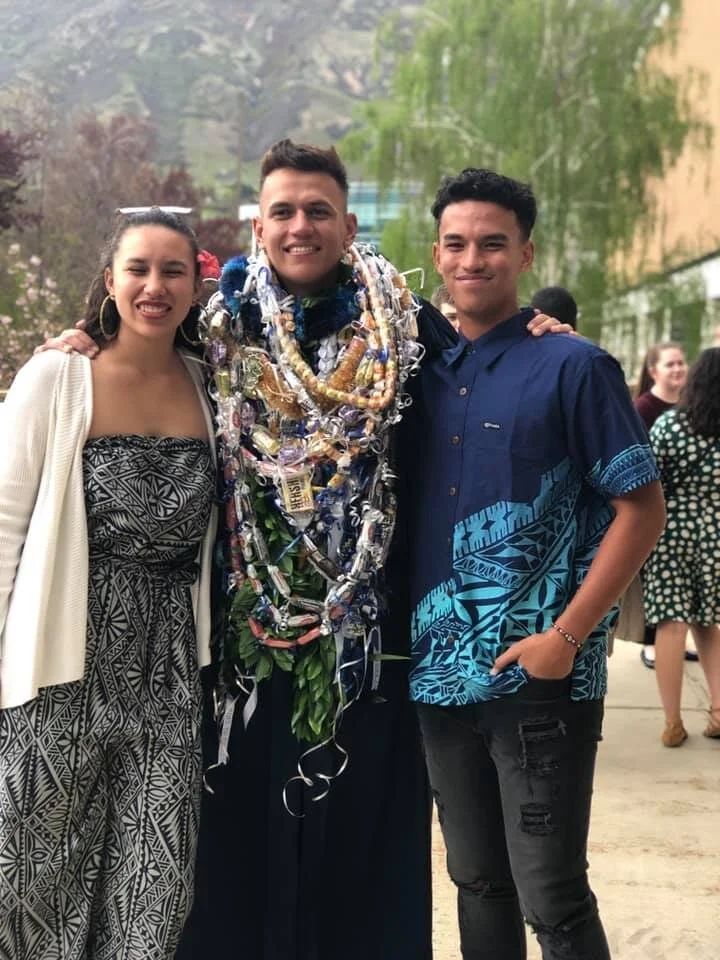American Samoan Harvard Law Student, Joseph V Langkilde | Applying Tautua in Higher Education Spaces
After graduating from Fa’asao Marist High School in American Samoa, Joseph V. Langkilde (JV) attended Salt Lake Community College before transferring to BYU where he majored in finance. Now a Harvard law student, JV talks about the graduate application process, provides tips for prospective law students, and discusses his grad school essay topic inspired by his family and tautua. He believes Pacific scholars should reflect on their cultural identity and how it has shaped them when applying to colleges and grad schools.
Tell us about where you grew up and your motivations for attending college.
I was born in Hawaii and raised in American Samoa. Growing up in American Samoa, life consisted of school, family, sports and feaus (chores). But of these activities, education was definitely the priority in my household. Both my parents really fostered a great environment for learning both as role models and leaders. When I look back at what motivated me, my mother’s educational journey was one that truly inspired me. With less resources than I had, she put herself through higher education, both at the University of Hawai’i Manoa and their law school, the William S. Richardson School of Law. My father also had a tremendous impact on my educational journey, working as my high school principal and really shaping my high school experience.
Beyond my perception of school as a vehicle of opportunity, I was additionally motivated to attend college to play baseball. This passion was something I worked at and one that put me in touch with someone who has had a tremendous influence on my path thus far, Brent Haring. Ultimately, it was the people in my life and community that motivated and shaped my educational path.
Tell us about your switch in career interests from baseball to law school.
The switch has been much more seamless than you might imagine. In undergrad, I played baseball at Salt Lake Community College and worked for Brigham Young University’s baseball team. Playing and working in baseball helped me develop critical thinking skills to analyze the game. Coming into law school, I have seen parallels between the problem solving process in baseball and in my legal courses. In addition, playing and working throughout undergrad required that I develop time management skills to stay on top of my courses. These time management skills have served me well thus far in law school.
How was studying for the LSAT?
After taking the SAT in high school, I remember feeling like I should have made studying more of a priority. Coming into my LSAT preparation, I didn’t want to have a similar experience. To make sure it became a priority, I gave away my playstation, deleted all my social media accounts, and spent about 20 hours per week on the LSAT. Those 20 hours a week consisted of 9 hours of LSAT class, 3 hours on Saturdays for practice tests, and around 8 hours throughout the week reviewing notes from class and mistakes from tests. That was my life for 6 months. My goal was to finish the LSAT by June of my junior year so that I could focus on application essays during the summer and fall of my senior year.
What did you write about in your law school essay?
I talked about tautua — sacrifice and service to your community, family, and village that is very central to the Samoan culture — and how that value played out in my life.
When I graduated high school, I was 16. After graduation, I didn’t know if I was ready to move to the mainland. So, instead of going directly to school, I spent a year at home. During that year, I felt obligated to contribute in whatever way I could to my family and community. Every morning, I would iron my siblings uniforms, drop them off at school, then come back to wash the clothes and hang them up on the line. After this, I would pick my siblings up, bring them home, and help prepare dinner before going to my part-time job as a math tutor. Each week I was also responsible for making sure that we had drinking water by walking to the front of the road to fill up our five gallon bottle with suitable drinking water.
This became my daily routine during my year off from school. By writing about this sense of work and dedication to the familial community, I hoped to highlight Samoan values in my upbringing and what they have meant to my development.
What advice do you have for students to prepare for college and law school?
For high school students looking at college: Dream big and take small steps towards that dream. A big dream can feel very overwhelming. Where you can, break down your bigger goals into miniature goals and steps. Take little steps everyday to move closer to your goal. Never be afraid to take your shot at opportunities. You never know the people you might meet in the process of taking your chances.
For students applying to law school: Start early so you don’t feel rushed. By breaking down my application process into two parts (LSAT and essays), I gave myself the chance to focus on one hurdle at a time and account for any setbacks. That being said, though the LSAT’s importance will vary school by school, I feel that the essays are an extremely important place to separate yourself and really let the admissions committee in on who you are. Design your app to give them the best understanding of who you are.
For Pacific Islander Students: Never forget the power of your community. With a lack of representation in higher education amongst our community, it can be easy to feel isolated in these spaces. At various junctures in my path, I know that I often felt this way. Whenever I felt this sense of isolation, I would focus on my Samoan community back home and in Utah. Their presence often gave me encouragement and strength when I needed it. In this way, the Pacific Island community has a power that is beautiful. Nurture this community and be proud of it.
Want to give back to the Pacific community? We are 100% volunteer-led nonprofit. Help keep our programs stay free for our Pacific scholars.


